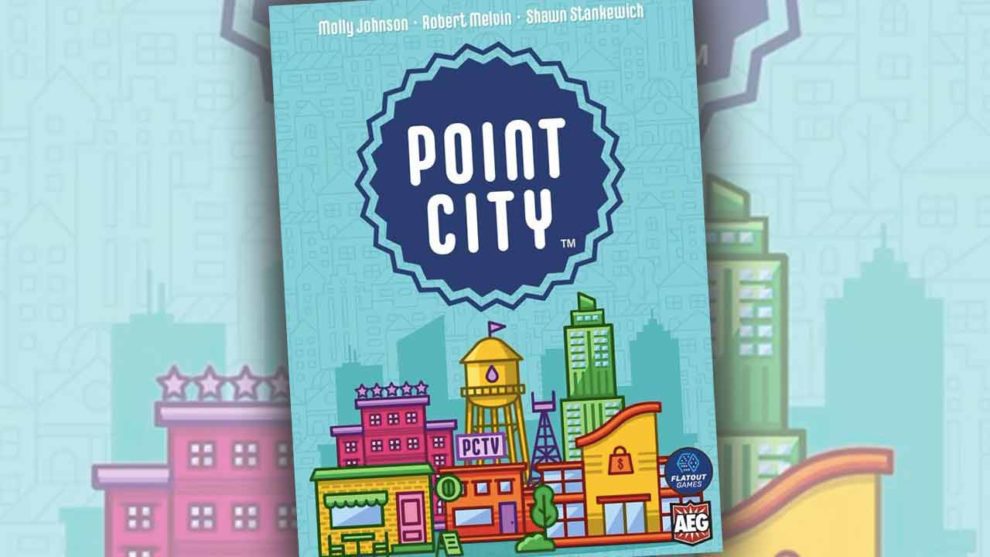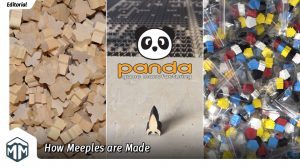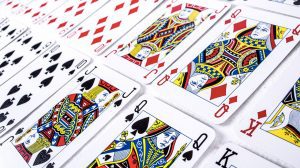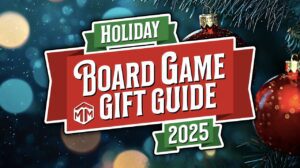Disclosure: Meeple Mountain received a free copy of this product in exchange for an honest, unbiased review. This review is not intended to be an endorsement.
If you’ve been around board gaming for a few years, you might have heard of the hit game Point Salad, a lovely, chaotically fun, card game from Flatout Games. In Point Salad, players draw cards from a shared tableau. One side of each card features a veggie (onion, tomato, yellow pepper, lettuce, cabbage, carrot), while the other side shows a scoring condition (2 points per carrots, 5 points for every combination of tomato, cabbage, and onion, etc.). The tension of the game comes from trying to balance the collection of scoring cards, which will earn you points, with the collection of veggie cards which make the scoring cards possible.
Now Flatout Games is releasing Point City, a game with a similar style to Point Salad, but with the addition of more strategic elements. The campaign for Point City was launched on Kickstarter earlier this week, so let’s dive in and take a look.
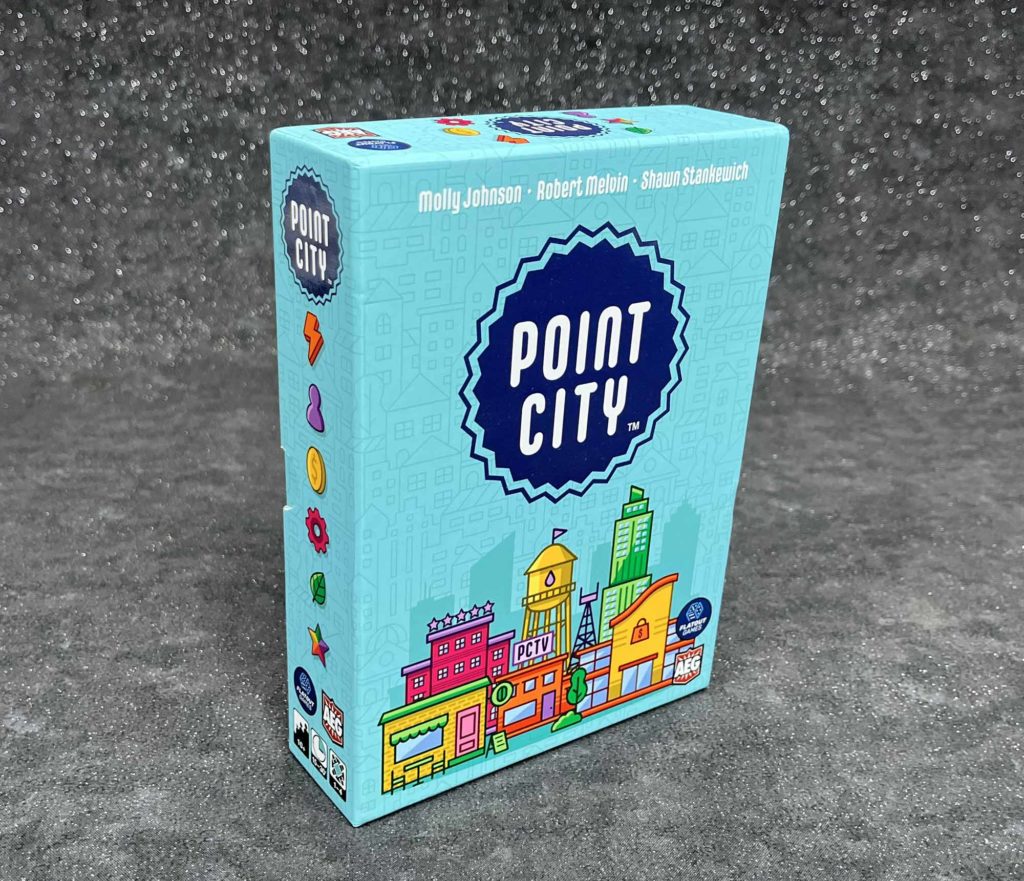
Point City Overview
In Point City, players are trying to build the most interesting and lucrative city by again drawing cards from a shared tableau. But this time, instead of collecting veggies, players collect resources (energy, industry, economy, community, ecology, and ingenuity) and buildings. Resource icons appear on one side of the cards, while the other side shows buildings.
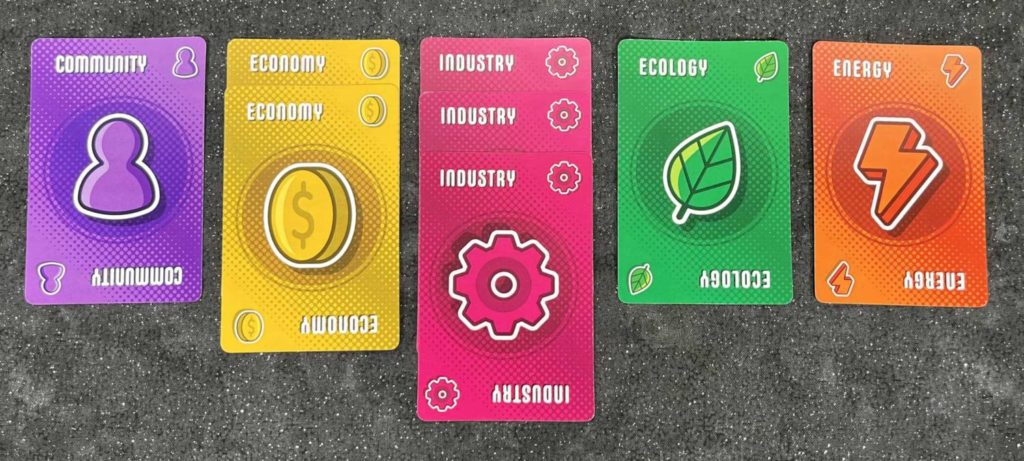
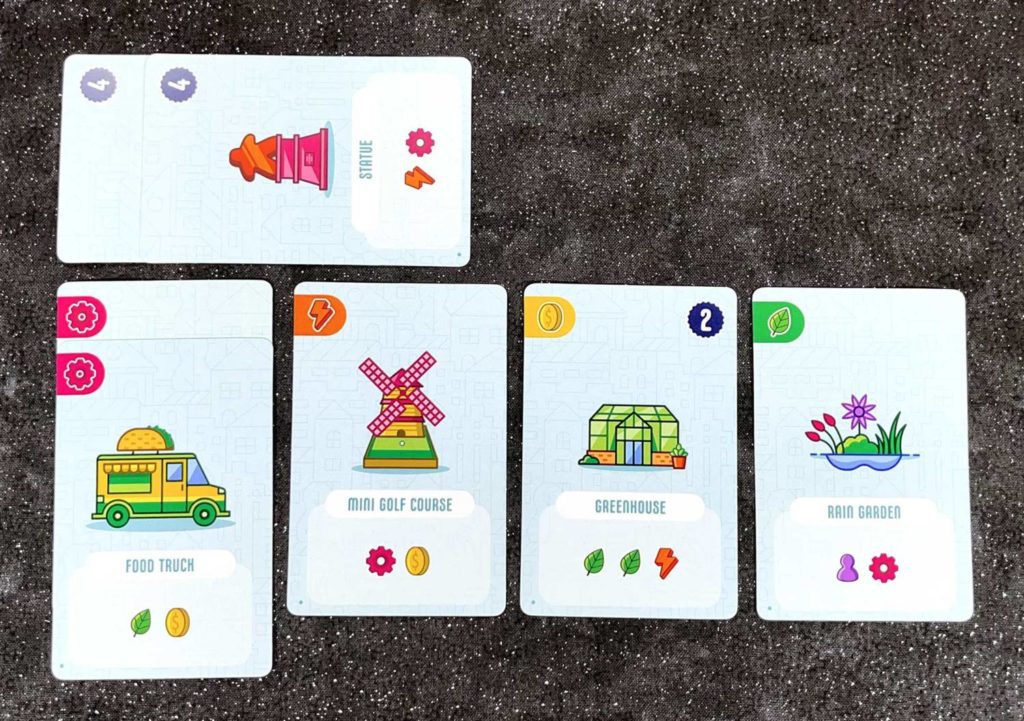
In Point Salad, players keep their veggies throughout the game, while in Point City resources are spent to construct buildings—the cost of each building is shown at the bottom of each building card. Some buildings provide points, many buildings provide a permanent resource that players can use in the construction of additional buildings, and some buildings are “civic buildings” (more on that in a moment). If you’ve played engine building games like Splendor, then you’ll feel right at home with this type of gameplay.
“But Andy,” you might say. “How do I get resources or buildings”? Good question, let’s take a look at the setup of Point City, and a round or two of game play.
Point City Setup
Point City has a large deck of cards, broken down into 3 tiers, indicated by both the different color building side and the number of dots shown on the bottom left corner of each building. In general, cards from the higher number tiers are more valuable but correspondingly more expensive.
To prepare for a game, shuffle each tier separately, remove a number of cards from each tier based on player count as listed in the rulebook, then stack the tiers in ascending order (3, then 2, then 1 on top), with the resource sides all facing up. Deal out a 4 x 4 grid of cards with the resources facing up. Randomly select a number of face up civic tokens based on player coun Give each player a wild ingenuity card and you’re off to the races.
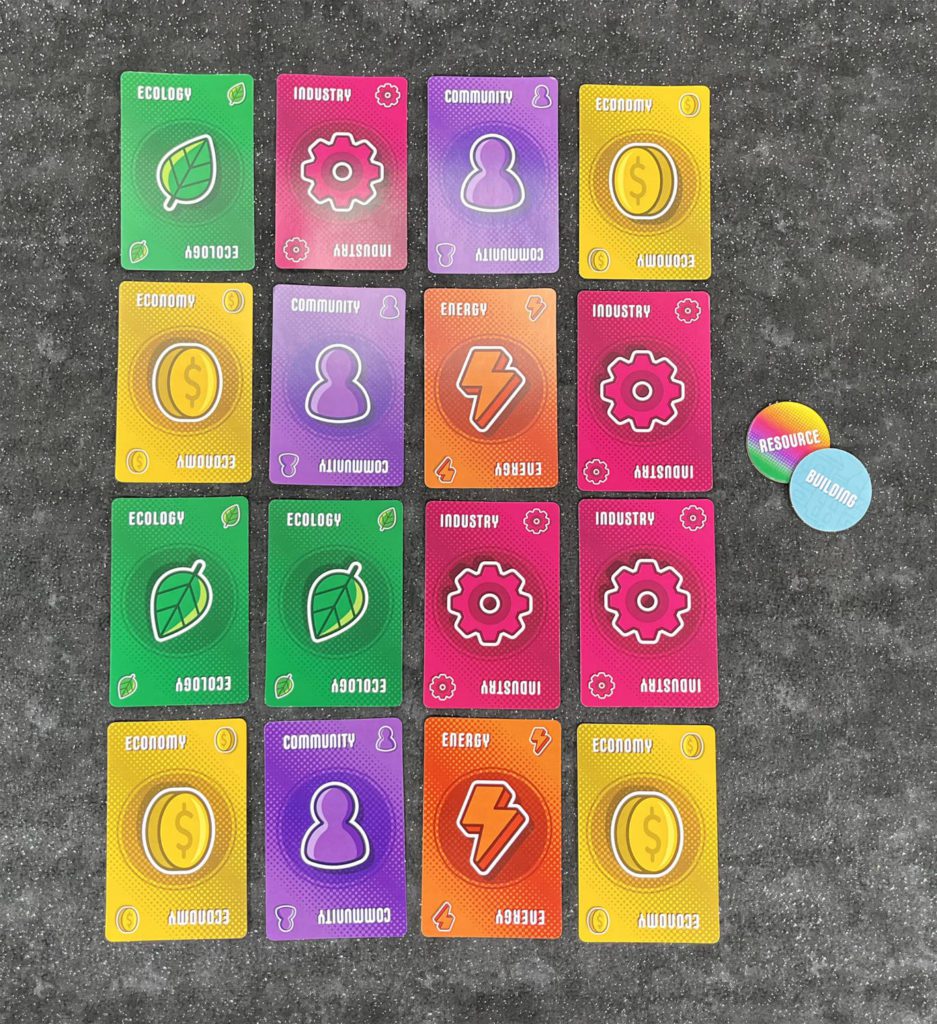
A Round of Point City
In Point Salad, players could select any two cards from the tableau, anywhere they liked. In Point City, things are a bit more restrictive. Players can either draw two cards from the deck, or two cards from the tableau. But when drawing cards from the tableau, the cards must be orthogonally adjacent (no diagonals), and if drawing a building card you must be able to pay for the building card completely or you can’t draw it. You may however draw two of your two tableau cards in any order, which means you can pay for the cost of your second card with the results of the first card.
“But!” you cry. “If the cards are dealt with the resource side face up, how do we get building cards?!”. That’s where one of the nifty things about Point City comes into play. Like any good city in today’s day and age, Point City is self correcting. When a card is drawn, players replace it with the next card from the deck, but with the opposite side. That means after a few turns, the tableau might look something like this. The designers have made it easy to remember which side needs to be dealt by providing handy tokens indicating what goes where.
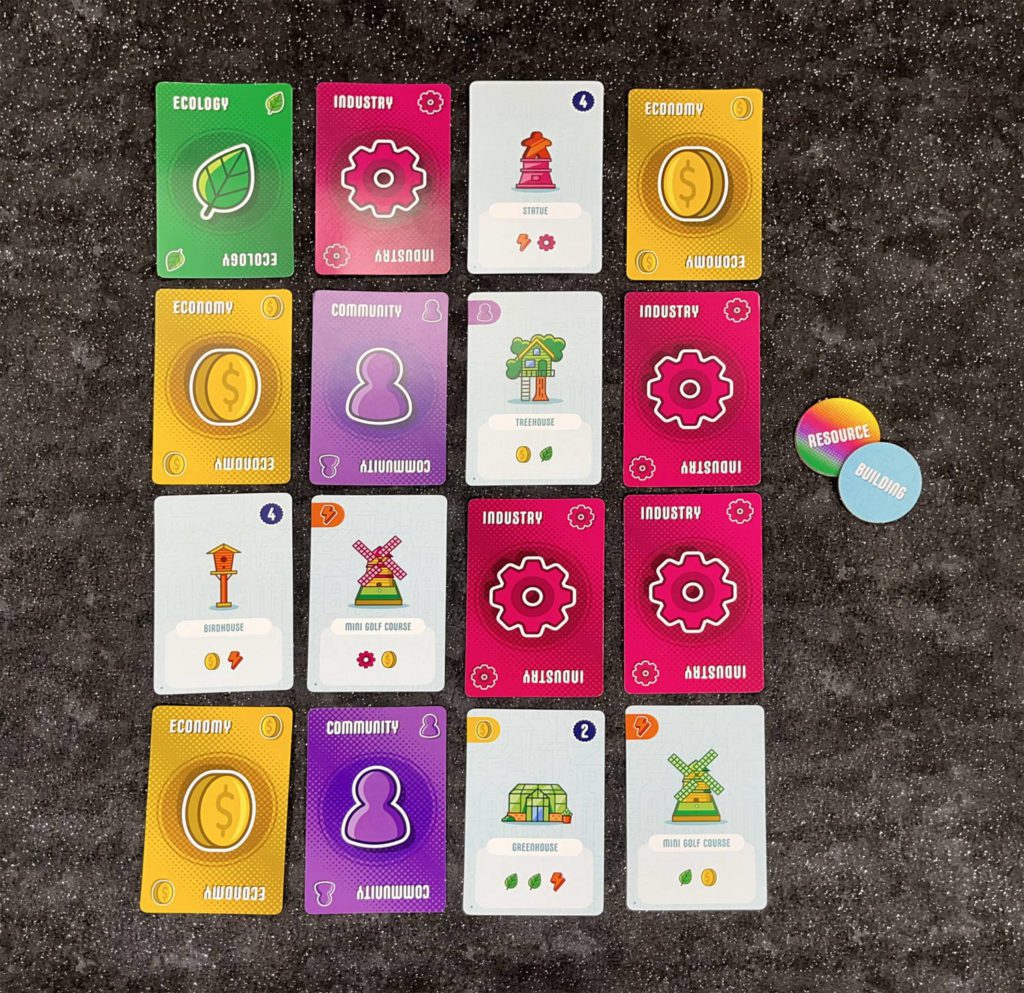
Civic Buildings
Most buildings provide points, and/or permanent resources, but a small number of cards display a “civic building” icon in the top right corner. When constructed, a civic building allows the player to select a civic token which confers valuable end game scoring conditions (similar to Point Salad).
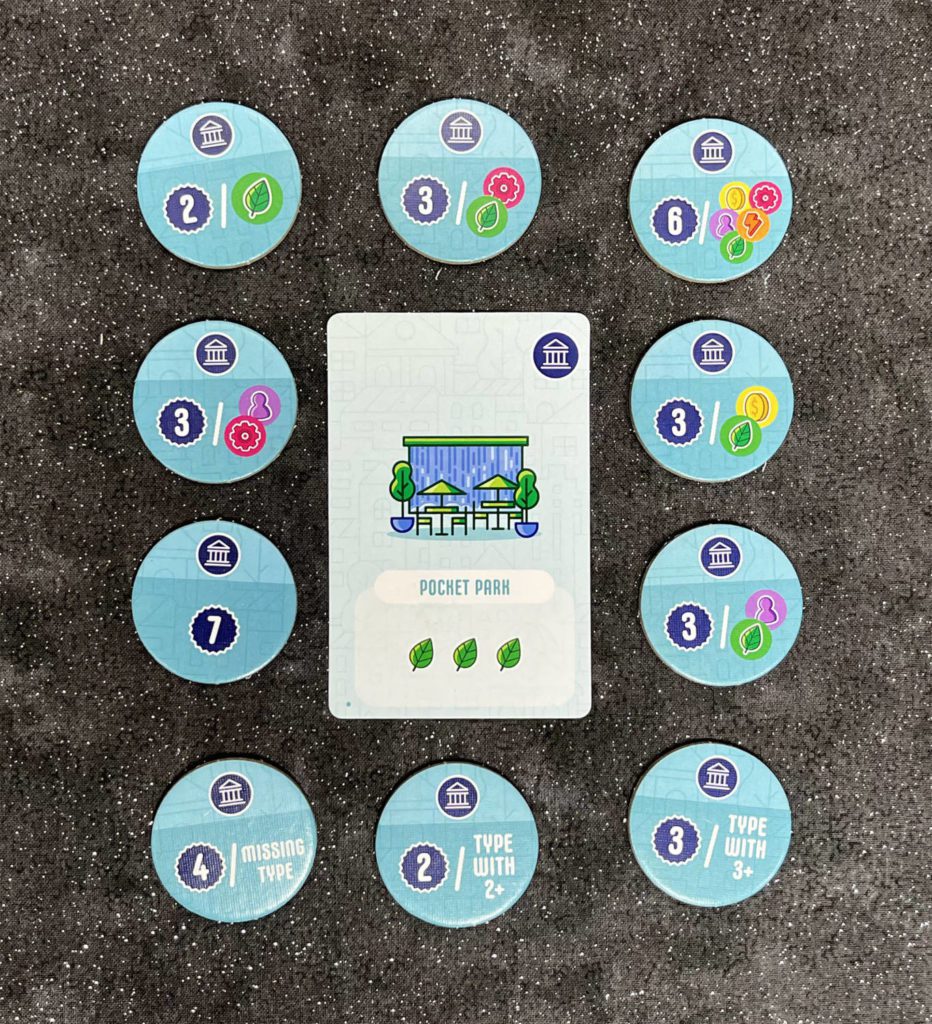
Finishing Point City
Players continue drawing cards and replacing them from the top of the deck until the tableau cannot be filled. This signals the end of the game. Players tally up scores from buildings and scores from civic tokens, and whoever has the most points wins the game.
Final Thoughts on Point City
Point Salad was a huge hit with the gaming community at large, but also with my friends and family. It’s just tactical enough that you have to monitor what other people are doing, but casual enough that you don’t need to spend much time doing so. It’s firmly in the light card game camp, which means it’s perfect to introduce to anyone, no matter their gaming experience level. Point City on the other hand is definitely a bit more strategic and received the valuable “I’ll back it on Kickstarter” seal of approval from experienced players.
So what do I think of Point City? I like it, quite a lot, in fact. Dylan Mangini really stretched his legs in the graphic design of the game, with hundreds of unique building illustrations, and six new resource icons. The colors are also still as vibrant and energetic as in Point Salad. The gameplay is great as well. I love engine building games so Point City was a natural for me. The distribution of the resources appears to be roughly even, so there doesn’t appear to be any one clear “path to victory”. That means players will need to discover their own path to victory.
Players should consider collecting a mix of resources at the beginning of the game so that they have some flexibility, then start constructing buildings as soon as they can. The decision to throw up a building that only gives a resource, vs one that gives points isn’t an easy choice, although I almost always focus on getting my engine going as early as I can—again with a mix of buildings. Constructing civic buildings will not only give you extra points at the end of the game, but also help guide your energies into resource combinations that will synergize with your existing city.
My only complaint about Point City is how the cards are dealt out. Believe it or not, it’s hard to remember what card was drawn from which spot, and it’s critical that the right side of the card is dealt out or the city won’t self-correct. But we’re in luck because the designers provided two double-sided tokens to drop onto an empty spot to help indicate what should be replaced. But even then, we still occasionally got confused about what should be put out. Thankfully, that’s a relatively minor concern, and gets easier with multiple plays.
For those of you who love Point Salad, rest assured that Point City isn’t going to replace it— in fact, it’s not meant to. They’re more like siblings than descendants; sharing the same DNA and look enough like each other that you know they’re related, but each is distinct in their own way. So if you love the clean lines and iconography, and quick gameplay of Point Salad, as well as the strategic focus of engine building games like Splendor, then Point City should definitely be on your radar.


